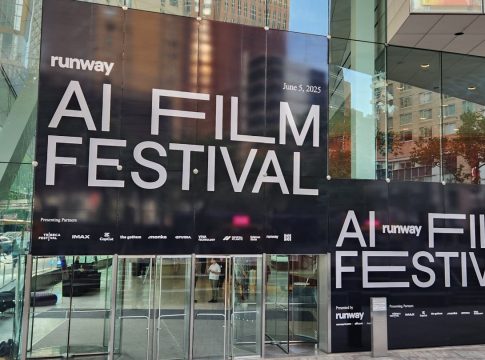AI Film Festival: A Glimpse into a New Creative Era
An hour before the AI Film Festival kicked off, excitement buzzed down Broadway. Attendees, eager for a taste of creativity powered by artificial intelligence, formed one of the first major crowds celebrating machine-generated art. With Runway AI as the main sponsor, the festival took place at Lincoln Center’s Alice Tully Hall—an iconic venue that has hosted numerous renowned cultural events.
A Gathering of Innovators and Enthusiasts
Spectators donned "I ❤️ AI" shirts, while others snapped selfies against Runway’s sleek black-and-white branding. The energy was palpable, with attendees eager to witness AI’s artistic potential. "I just want to see something interesting," one festival-goer remarked, summing up the collective anticipation in the room.
Cristóbal Valenzuela, one of Runway’s co-founders, took the stage to reflect on the event’s evolution: “Three years ago, this was a crazy idea,” he shared. The festival has grown remarkably—from receiving merely 300 film submissions last year to a staggering 6,000 this time around.
Showcasing AI’s Creative Power
Runway, founded in 2018, has captured attention in Hollywood, notably due to a partnership with Lionsgate that allowed the training of an AI model on its extensive library. This collaboration illustrates the industry’s shift toward embracing AI as a viable tool for creativity.
During the festival’s two-hour showcase, ten films were screened, each highlighting a dream-like, experimental aesthetic. Projects varied in theme—ranging from poignant reflections on childhood to surreal narratives exploring the boundary between reality and imagination. For example, More Tears than Harm portrayed a painterly animated journey through a challenging upbringing in Madagascar, while Fragments of Nowhere featured striking visuals like floating bodies and cars suspended in the air.
Bridging Art and Technology
Flying Lotus, a renowned music producer, joined Valenzuela on stage and encouraged the audience to embrace AI tools. “Don’t let anybody tell you there are rules to this,” he declared, promoting a paradigm shift in creative expression.
Following the film screenings, awards were distributed, with the runner-up prize going to Jailbird, a touching narrative that highlighted the intersection of compassion and rehabilitation through the eye of a rescued chicken. The Grand Prix winner, Total Pixel Space, contended with the idea of infinite cinematic possibilities, highlighting the potential for AI to enrich the art form rather than diminish it.
Implications for the Future of Film
Valenzuela emphasized that AI is beginning to alter the artistic landscape, transforming not just the mechanisms of filmmaking but also the essence of storytelling. While Hollywood executives may be hesitant to fully embrace these technologies, fearing increased operational costs, the festival made a compelling case for originality and innovation in AI-generated films.
As attendees filtered out of the hall, discussions bubbled with curiosity and contemplation. One young man raised an important question: “Did you think about what prompts were being used the entire time?” This reflects a broader inquiry into the role of human creativity in a world increasingly influenced by artificial intelligence.
The AI Film Festival stands as a testament to the evolving relationship between technology and art, suggesting that AI could unlock new avenues for storytelling—one that merges human intuition with machine capabilities.

Writes about personal finance, side hustles, gadgets, and tech innovation.
Bio: Priya specializes in making complex financial and tech topics easy to digest, with experience in fintech and consumer reviews.

